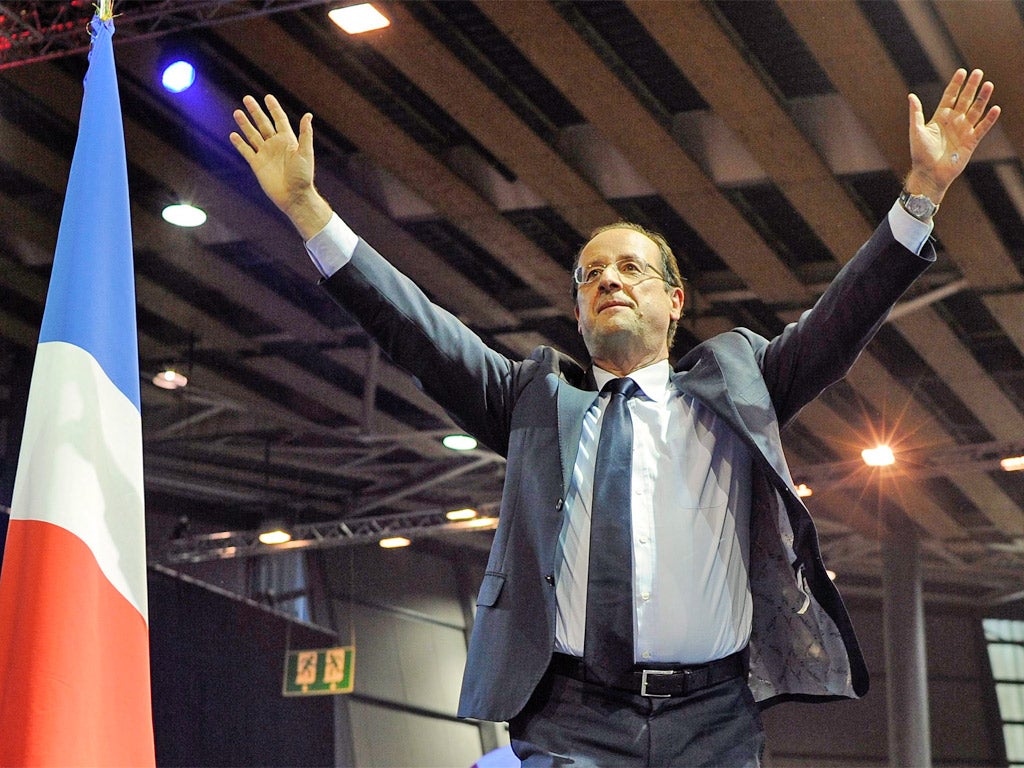François Hollande builds lead as Nicolas Sarkozy allies admit writing is on the wall
Poll saying socialist could win by 14 per cent leaves right wing in despair

Confronted with plunging polls and deserting allies, President Nicolas Sarkozy faces the prospect of a rout in the two-round French presidential election starting this weekend, with senior members of his government already said to be certain of defeat.
Supporters of the front-running Socialist candidate, François Hollande, could scarcely contain their euphoria when they gathered in Lille for their last big rally on Tuesday night before French electors go to the polls on Sunday. They interrupted the candidate's speech endlessly with chants of "François president, François president".
"You are well informed," Mr Hollande quipped. "It is possible we are going to win. It's not certain... but, yes, I feel the hope rising."
New polls published yesterday suggested that Mr Hollande, 57, was leading the field of 10 candidates in the first round with up to 29 per cent of the vote. He had extended his lead over Mr Sarkozy to between two and four points. In voting intentions for the two-candidate, second round on 6 May, Mr Hollande now leads the President by a "landslide" margin of 14 to 16 per cent.
In a series of damning, private remarks, reported by the Le Canard Enchainé newspaper, senior members of President Sarkozy's government said that defeat now seemed inevitable.
"The carrots are cooked," the Prime Minister, François Fillon, was quoted as saying. "[Sarkozy's] strategy of campaigning on hard-right issues was a serious mistake." The former centre-right prime minister, Jean-Pierre Raffarin, was reported to have said privately: "There is no chance of us winning."
The President has also suffered a series of desertions. It was reported earlier this week that the former President Jacques Chirac intended to switch sides and vote for Mr Hollande. A clutch of former Sarkozy ministers and supporters, from the right, left and centre of French politics, have also declared they will vote for the socialist. They include Martin Hirsch and Fadéla Amara, two of Mr Sarkozy's ministerial recruits from the Left after his 2007 election and three former centre-right Chirac-era ministers, Azouz Begag, Corinne Lepage and Brigitte Girardin.
The President has fought an energetic but erratic campaign. He began by warning that France needed tough medicine to escape recession. But he then switched to a hard-right message to reclaim votes from Marine Le Pen's National Front.
In recent weeks, Mr Sarkozy warned that French "identity" was menaced by a tide of illegal immigration, Islamist terrorism and halal meat. Last Sunday, he stole abruptly – and without acknowledgement – Mr Hollande's argument that the European Central Bank should be allowed to pump reflationary cash into Eurozone economies (a policy that Mr Sarkozy had opposed with Germany).
Mr Sarkozy's sharp right turn propelled him into a narrow lead in first- round opinion polls but that support now appears to have dribbled back to Ms Le Pen. In polls published yesterday, she regained third place with around 17 per cent of the vote.
The hard-left candidate, Jean-Luc Mélenchon, whose lurid anti-capitalist rhetoric has illuminated an uninspiring campaign, fell back to fourth place with around 13-14 per cent.
Through all these twists and turns, Mr Hollande has held his nerve. At the Lille rally, he said he would bring a three-part approach to the economic crisis: "responsibility" (deficit cuts, mostly through tax rises); "growth" (EU capital investment programmes and the reflationary printing of euros); and "solidarity" (help for poorer people and poorer EU countries).
Still, the limitations of "Hollandism" were apparent. He failed to fill a giant pop-concert venue from which most seats had been cleared. The crowd of 15,000 cheered his rhetoric against "big finance" but became fidgety as Mr Hollande explained the minutiae of his plans.
The Socialist top brass, seated nearby, were, however, two steps ahead of Mr Hollande. Their chatter was not about the first or second rounds but the "third round": who would be "in" and who would be "out" in the first centre-left government for a decade. The favourite to be Mr Hollande's prime minister is the Socialist party leader, Martine Aubry, daughter of former European Commission President Jacques Delors.
Mr Hollande and Ms Aubry briefly held up one another's arms in a victory salute at the Lille rally. However, their stiff body language suggested the prime-ministerial choice has yet to be made.
Presidential election: How the voting works
The opening round of the presidential election this weekend is the first of four polling days in just over two months. On Sunday, French voters will choose between the 10 candidates. The top two go on to the second round on 6 May, after which the winner will hold office for five years, not seven as used to be the case.
He (never yet she) will be the ultimate arbiter of French policy but will not run the government day to day. To do that, the President will choose a Prime Minister. He, or possibly she, will seek to win a parliamentary majority in the lower house of parliament.
These "legislative elections" will be fought, once again over two rounds, on 10 and 17 June.
Join our commenting forum
Join thought-provoking conversations, follow other Independent readers and see their replies
0Comments